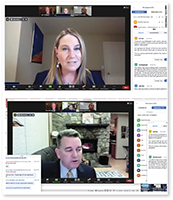So You Want to Relocate?
September 01, 2021
What to know about the desperate search by school boards for experienced leadership emerging from a dark period

Another day, another RFP for superintendent search consultants. All search firms can attest there has never been a busier year than 2021.
And those of us in the executive search field who are retired superintendents have never been busier consoling
and advising our sitting superintendent colleagues. The pandemic put countless superintendents in no-win situations as they were caught in the middle of endless and often bitter debates among stakeholders regarding re-entry, remote and hybrid teaching,
learning loss, rising mental health challenges, truancy, grading, athletics and other extracurriculars. As a result, some superintendents opted for early retirement, while others sought greener educational pastures. Others were pushed out by angry
board coalitions, unions or parent groups.
The number of superintendent vacancies soared, and while initially good for search firm business, it became more difficult to fulfill boards’ No. 1 request: Find an experienced sitting superintendent
with no adverse publicity! Sure, and we will untie the Gordian Knot and solve the Riemann Hypothesis while we’re at it!
We found that sitting superintendents who had successfully navigated the pandemic challenges were not eager to
move. Even higher compensation and ideal locations were not worth the risks of relocating. Moreover, school boards are more eager to reward these superintendents with additional incentives for staying put. In fact, one superintendent finalist returning
from an out-of-town interview was met at the airport by his board president with a highly lucrative multiyear offer to remain in the district.
This Content is Exclusive to Members
AASA Member? Login to Access the Full Resource
Not a Member? Join Now | Learn More About Membership
Author
Helpful Hints for Online and In-Person Interviews

Max McGee, a former superintendent who leads the superintendent search firm Hazard, Young, Attea & Associates, prepared the following tips for candidates in executive leader-ship vacancies in school districts.
Before the interview:
- Do your homework: Peruse websites, conduct a Google search (news and images); learn the mission, vision and values; jot down the strategic plan goal; familiarize yourself with the strengths and challenges; and watch some online school board meetings.
- Create a list of points you want to make that demonstrates how you can and will contribute to the district and community.
- Listen and think before answering questions and answer all parts to a question with multiple points.
- Anticipate questions, prepare talking points and practice, practice, practice.
- Share stories that reflect who you are and what you value.
- Make your opening and closing count, as they are critically important.
- Know what to say when asked if you have any questions. (Our advice: Simply thank them for their time and make your closing remarks.)
- Make a practice recording of your opening and watch it to see how you can improve.
During an online interview:
- Be in an office or business-like setting and do not use a Zoom background or photo background.
- Move distracting items out of sight and prevent sounds that interfere (a barking dog, phone ringing, etc.)
- Close all applications on your device except for the one you are using.
- Position your camera at eye level, meaning you may need to put a laptop on a stand or stack of books.
- Look into the camera when you talk and use your non-verbal cues as best you can. (Essentially, you are acting in these situations, so nods, head tilts, eye movements and facial expressions are all important.)
- Clear ahead of time anything you intend to screen share.
- Smile. Maintain eye contact. Breathe. Exude energy. Make a note to exhibit calmness and confidence.
- Dress like you have the job. Maintain an “athletic” posture. Silence is on your side.
- Use your hands to exhibit relaxed confidence, trustworthiness and strength.
Advertisement
Advertisement
Advertisement
Advertisement



